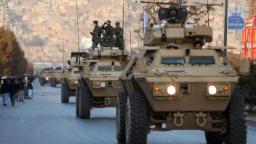The Taliban executed scores of Afghan security forces members after surrender, HRW report alleges

[ad_1]

The HRW report detailed “the summary execution or enforced disappearance” of 47 former members of the Afghan National Security Forces (ANSF), including military personnel, police, intelligence service members and paramilitary militia, who had surrendered to or were apprehended by Taliban forces between August 15 and October 31.
HRW says the report is based on a total of 67 interviews, including 40 in-person interviews with witnesses, relatives and friends of victims, and Taliban fighters. Some people were granted anonymity by HRW for their report. In some cases, families report stories of people who simply disappeared.
The findings of the investigation would make a mockery of the Taliban’s previous claims to the international community that it would lead a more inclusive government than it did two decades ago. Its leaders had promised a reprieve for those who collaborated with US forces during the American presence in the country.
The report focuses on Ghazni, Helmand, Kandahar, and Kunduz provinces, but HRW says “the cases reflect a broader pattern of abuses reported in Khost, Paktiya, Paktika, and other provinces.”
CNN has not able to independently confirm the claims in the report, and multiple calls and text messages to Taliban officials have not been returned.
HRW says it sent the Taliban a copy of their report on November 7. In response, HRW says the Taliban said they had removed from their ranks 755 members found to have committed such acts and had established a military tribunal for those accused of murder, torture, and illegal detention. They also said that executions of people taken into custody were not allowed unless decided by a Sharia court.
In their official response to HRW, the Taliban said that not all information is accurate.
“Some cases of chasing or detention of some people you mentioned in your report are not based on these people’s past deeds, but they are engaged in new criminal activities. Our intelligence information about these figures show that they try to create problems and plots against the new administration,” they said.
‘More than 100 killed or forcibly disappeared’
HRW’s research indicates that Taliban forces have killed or forcibly disappeared more than 100 former security forces members in just these four provinces in the three months since their takeover of the capital Kabul, on August 15.
HRW researchers add, “They have also targeted family members of former security force members.”
A man from Kandahar described to HRW what happened when the Taliban knocked on his door searching for his brother, a former member of the ANSF.
“There was a knock on the door. The [Taliban] asked: ‘Is [your brother] home?’ I said no. ‘Do not be scared, tell him, we want to talk to him.’ I said no, he is not home. A couple of days later, they took my brother from the street. We looked everywhere. We went to the Taliban, who denied involvement. Two days later we found his body.”
“Summary killings and enforced disappearances have taken place despite the Taliban’s announced amnesty for former government civilian and military officials and reassurances from the Taliban leadership that they would hold their forces accountable for violations of the amnesty order,” HRW says.
One Taliban fighter described a former prison official who was allegedly executed after being called back to work in August.
“The commanders called him back to the job after a few days [after taking control of Kunduz]. They said, ‘Your job is here, you know this job.’ The prison has three gates. [‘Muhammad’] crossed the first gate. He was shot dead between second and the third gate.”
“In the weeks before the Taliban overran Kabul, revenge killings, including the targeting of government officials, were already on the increase in major cities and along key highways,” HRW says, adding “The Taliban, through their intelligence operations and access to employment records that the former government left behind, have identified new targets for arrest and execution.”
HRW alleges information that was collected as part of a so-called “amnesty program” that would guarantee the safety of surrendering ANSF forces was used “to detain and summarily execute or forcibly disappear individuals within days of their registration, leaving their bodies for their relatives or communities to find.”
HRW says “many Afghans interviewed expressed fear that if they register with the Taliban to receive the amnesty letter, they might be identified or recognized and face violent retaliation. At the same time, the Taliban have also searched for and detained people who failed to register.”
The report alleges the Taliban have also searched for known former security force members, “often threatening and abusing family members to reveal the whereabouts of those in hiding,” adding: “Some of those eventually apprehended have been executed or taken into custody without acknowledgment of their detention or their location, the crime of enforced disappearance.”
HRW says while Taliban officials have repeatedly denied their forces have carried out killings and disappearances, “Increasing evidence suggests that summary executions and disappearances, among other abuses, are being carried out by senior Taliban leadership at the district or provincial level.”
Researchers say on September 21 the Taliban announced the establishment of a commission to investigate reports of human rights abuses, corruption, theft and other crimes, but “as of November 22, the commission had not announced any investigations into any reported killings, although it did report on the arrest of several Taliban members for stealing and the dismissal of others for corruption.”
Concern for minorities
Since the US withdrawal from Afghanistan and subsequent Taliban takeover there has been concern that long-persecuted ethnic and religious minorities, such as the minority Shia Hazara ethnic group, would be targeted as they were under previous Taliban rule.
Concerns are growing that Afghanistan will become increasingly isolated from the world, and continue to strip away the rights of women, religious minorities, LGBTQ people and former officials.
[ad_2]
Source link






